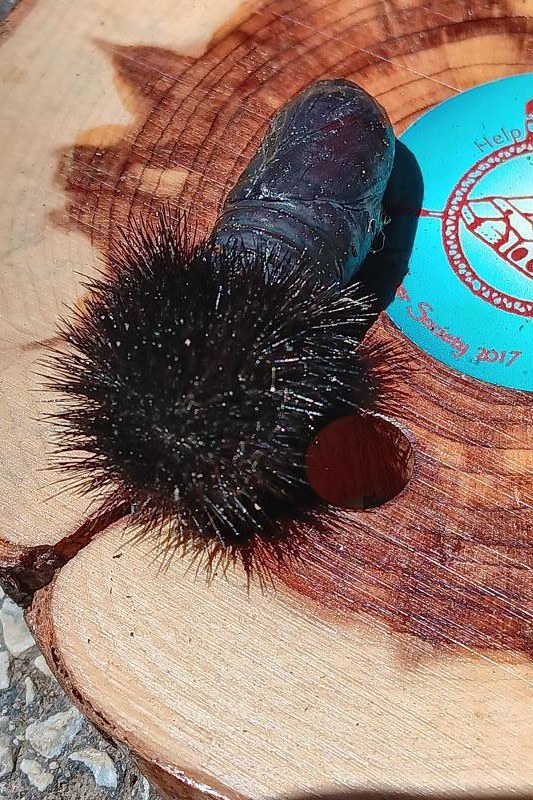Posted: October 18, 2024
Delaware County's Penn State Master Gardeners offer free, science-based solutions to any and all questions about perennial plants, garden soil, vegetable growing, native plant species, plant and pest identification, and just about anything else having to do with home gardening.

Giant Leopard Moth
If you don't know an answer, the next best thing is knowing where to get it. Look no further than Delaware County's Penn State Master Gardeners.
And just so you know, you can ask just about anything.
- "Why aren't my peppers fruiting?"
- "Why does my cantaloupe die after the first round of melons ripen?"
- "And what's with this random hole in my backyard? Which animal did this?"
These are just a few of the real-life questions the hotline staff has fielded.
All of the information the hotline provides is science-based and researched by certified Penn State Master Gardeners. In addition to its own extensive library of resources at Delaware County's Penn State Extension office in Springfield, hotline staff have access to Penn State University's diagnostic and insect laboratories at State College, PA.
"One of the main benefits of calling the hotline is our ability to escalate the issue," notes Master Gardener Liz Brown, who, along with Master Gardener Cathy Weaver, heads up the hotline service. "If we can't identify a plant pathogen or insect issue, we can advise clients on what to include when the home gardener sends their soil sample to the Penn State Lab for analysis," Brown says.
An additional advantage the hotline offers is the ability to customize information to local gardening conditions, such as the Delaware County area's heavy clay-based soil. Gardeners can purchase a soil test kit at the office at Smedley Park and mail their sample directly to the Penn State Lab. Once they receive the results, they can review them with hotline staffers who can provide further guidance and answer any additional questions.
During walk-in hours, home gardeners also can bring in plant and insect specimens for identification.
"We have traditional and LED microscopes we can use to identify and then troubleshoot issues like root diseases," Brown notes.
Douglas Dooling, a home gardener in Drexel Hill, has used the hotline to ask whether certain insects he has noticed in his garden are beneficial or are a true pest that will eat his garden crop. Among other things, Dooling grows award-winning gourds, some of which he dries and makes into birdhouses that have won blue ribbons at the Pennsylvania Farm Show.
Ruth Joffe, a gardener in Wynnewood, has tapped the hotline with questions ranging from how to deal with Japanese beetles on rose bushes, to which native plants would thrive in her garden. She also has brought in leaf specimens during walk-in hours so they could be sent out to Penn State’s diagnostic labs.
"I have been using the hotline since 2020. I email probably six or so times each summer with various concerns," Joffe says. "And I always have gotten great responses that include a potential diagnosis and treatments, plus links to more information online," Joffe adds that she also appreciates that responses are science-based and focused on native, non-toxic solutions to garden problems.
If you have a home gardening question, you can call the Master Gardeners Garden Hotline at 610-690-2671 or email your question to DelawareMG@psu.edu.
The hotline is staffed on Tuesdays and Thursdays from 10 AM to 1 PM, from March 1 through October 31. Hours are reduced to Tuesdays only, beginning November 1 through February 28.
For more information on our Outreach programs, visit our social media pages on Facebook or Instagram.

